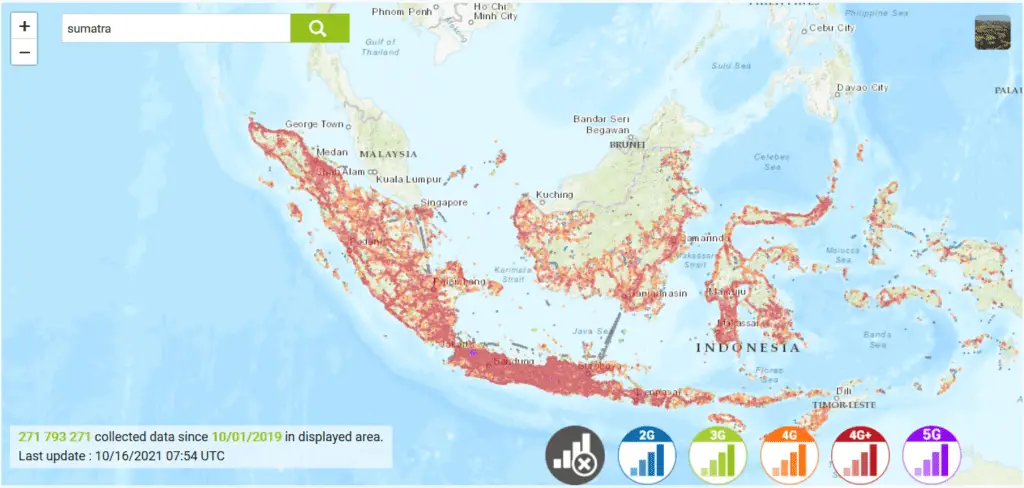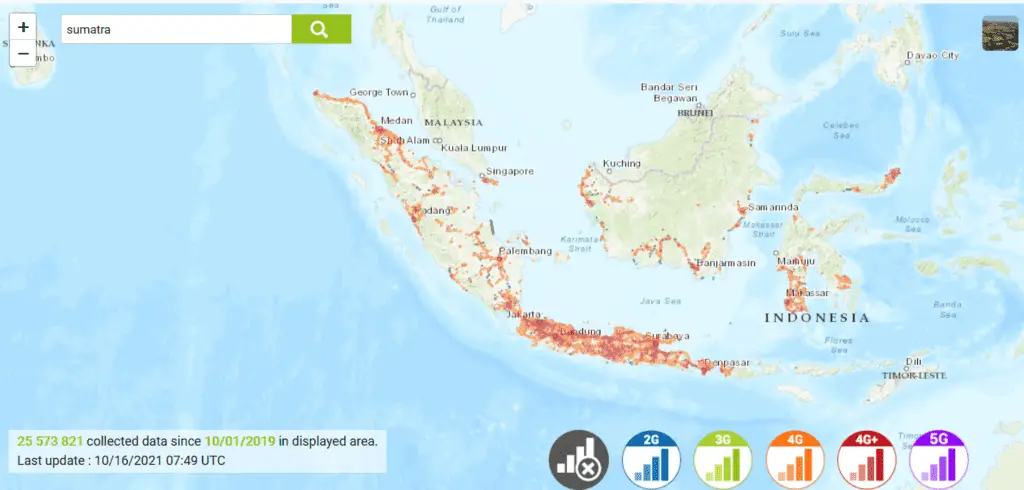Sumatra is still somewhat of an undiscovered gem, especially for digital nomads. However, it’s an incredibly beautiful island, full of plants and animals you won’t see anywhere else in the world.
But all of this could be in vain if the country’s laws and infrastructure don’t allow you to work remotely from Sumatra with ease.
So, what should we, the DNs do — to go or no to? To answer this, and the question: How is Sumatra for digital nomads, I’ve done my research. By the end, I hope to give you a clear idea of the process of getting and staying here.
Sumatra for Digital Nomads at a Glance
The Good:
- Amazing outdoor activities.
- A beach is always a stone’s throw away.
- Low costs of living.
The Bad:
- Frequent volcano activity and earthquakes.
- Indonesia’s difficult visa process.
An Introduction to Sumatra
Sumatra is an exotic island in west Indonesia that lures people in with its extraordinary beauty and varied wildlife. Moreover, orangutan-sighting tours are a major attraction, and the jungles are inhabited by rhinos, elephants, and tigers as well.
On the Indonesian island, the community is incredibly eclectic, filled with people of different beliefs and religions, and more than 52 languages are spoken. However, Sumatran people are quite unified, friendly, and welcoming to foreigners.
Connectivity in Sumatra
To actually be able to work remotely from Sumatra, you have to know about internet connectivity and coverage on the island. This is what you can expect when trying to get online.
WiFi in Sumatra
While Indonesia doesn’t have the best reputation for internet speeds, things seem to be slightly better in Sumatra. Namely, Sumatra dominates internet usage among the islands, so finding a connection here shouldn’t be a problem.
In larger, more populated cities, in particular, you’ll be able to find WiFi in most cafes, restaurants, and accommodations. The average download speeds for broadband connections are 25.58 Mbps for download and 14.74 Mbps for upload.
If you need a connection in more rural or remote locations, you’ll probably need to get your own portable internet. You can check out packages from Telkomsel, JavaMifi, or Webspot.
4G and Mobile in Sumatra
In the 4G mobile internet category, Sumatra edges out most of the Indonesian islands and territories. If you take a SIM card mobile package from one of the major providers (XL or Telkomsel), you can expect average download speeds are 13-14 Mbps.
Additionally, the availability of the network is in the high 80 to low 90 percentile with most providers. When it comes to coverage, I’d again recommend sticking with one of the major service providers, as their networks span the greatest percentage of the territory.
4G coverage for Telkomsel

As you can see on the map above coming from Nperf.com, with the right provider, you will be covered almost everywhere.
4g coverage with 3 tri

While with a poorer provider, you won’t get 4g everywhere.
Visas and Documentation for Sumatra
Indonesia allows some country nationals to enter the country without applying for a visa beforehand, or upon arrival to Sumatra.
Additionally, 169 countries are on a visa-free list, and as such, their nationals can stay in Sumatra for up to 30 days without applying for a visa. However, these visas cannot be extended or converted. So, if you plan on staying longer, you have a few options.
The Visitation Visa
This visa allows you to stay in Sumatra for 60 days and can be extended five times by a period of 30 days. When applying you can state one of the following as a reason for applying for the visa:
- Tourism
- Business
- Socio-Cultural Reasons
- Journalism
- Research
Finally, depending on whether you plan on going outside of Indonesian bounds, you can either apply for a single or multiple entry visa. For more information, check out Indonesia’s official visitation visa guide.
Pro Tip: Australian residents are in luck, as they are the only ones who can apply for Indonesia’s Working While On Vacation Visa. With it, they can legally stay and work as a Digital Nomad for up to a year.
Multiple Visit Visa
With this type of visa, you can state the same reason as you would when applying for a visitation visa. The biggest difference is that this visa allows you to re-enter the country for a period of up to one year. However, none of your visits can extend by 60 days.
The multiple visit visa also requires you to have a sponsor, either a person or a company, who will guarantee you and your expenses while you’re there.
For more information about Indonesian visas, you can check out this link.
Where Digital Nomads Live & Work in Sumatra
A lot of digital nomads question whether they can work remotely from Sumatra, and if so — where exactly should they go? To help you make a good, safe choice I recommend checking out one of the following places.
Medan
Medan is Sumatra’s capital and is commonly referred to as its most important city. Some digital nomads who work remotely from Sumatra tend to avoid it, because of its hustle and bustle — but can come to regret it.
The biggest reason is that all of the amenities you need such as big stores, computer repair shops, etc are mostly located here.
Also, in my opinion, Medan is special in its own right. The architecture is quite interesting, the local cuisine delicious, and there are plenty of places to get access to WiFi.
Living in Medan
Another perk of setting base in Medan is that there’s an abundance of inexpensive accommodations to choose from.
For one, there’s a hostel I really like (The Salty Dog) that costs only $8 a month — with breakfast included! If you’re in the mood for something fancier, you could stay in the Aryaduta Medan hotel, for around $50.
There’s even a co-living/co-working space Betahive, but it’s mostly aimed at teams and startups.
Working from Medan
Medan has several coworking spaces for DNs to work from and mingle in, but two stand out to me.
First, Cohub Coworking has a relaxed, but lux vibe and you can book a private office (price available on inquiry) or desks for $4. Another great option is the Clapham Collective, which offers flexible memberships, fast WiFi, and a bunch of perks such as pantry access, free tea, and coffee, etc.
Padang
If you’re looking for a less touristy place that allows you to fully experience Sumatra’s culture, I recommend staying in Padang. Although it isn’t a popular digital nomad location, I quite enjoy it, especially if it’s for a few weeks or a month.
Living in Padang
One of the things that Padang has going for it is cheap accommodations. Depending on the length of your stay, and your budget, you could consider renting a hotel room for your entire stay. I personally quite enjoy and recommend checking out Mercure Padang and Oxville Hotel.
As a cheaper option, you could also get a room in Kokos Hostel. The accommodations are close to the beach, and there’s a pool, private parking, and a garden on site.
Working from Padang
Because Padang isn’t your typical digital nomad location, it doesn’t have any co-working spaces. That being said, you should be able to get a decent internet connection in your hotel or restaurants and cafes in the city.
How is Sumatra for Digital Nomads — My Final Thoughts
Overall Sumatra is a great place to see, and relax in, but it’s not the most digital nomad-ready destination by far. That being said, the more adventurous, low-maintenance DN could enjoy the island. But if you require high internet speeds and a more westernized lifestyle, this may not be the right island for you. If you wish to know more about Indonesia and how is it to work from there in general, go check this article about digital nomads Indonesia.
